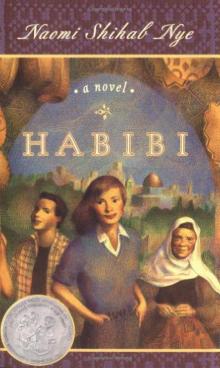Read Habibi Storyline:
The day after Liyana got her first real kiss, her life changed forever. Not because of the kiss, but because it was the day her father announced that the family was moving from St. Louis all the way to Palestine. Though her father grew up there, Liyana knows very little about her family's Arab heritage. Her grandmother and the rest of her relatives who live in the West Bank are strangers, and speak a language she can't understand. It isn't until she meets Omer that her homesickness fades. But Omer is Jewish, and their friendship is silently forbidden in this land. How can they make their families understand? And how can Liyana ever learn to call this place home?**From School Library JournalGrade 5-9. An important first novel from a distinguished anthologist and poet. When Liyana's doctor father, a native Palestinian, decides to move his contemporary Arab-American family back to Jerusalem from St. Louis, 14-year-old Liyana is unenthusiastic. Arriving in Jerusalem, the girl and her family are gathered in by their colorful, warmhearted Palestinian relatives and immersed in a culture where only tourists wear shorts and there is a prohibition against boy/girl relationships. When Liyana falls in love with Omer, a Jewish boy, she challenges family, culture, and tradition, but her homesickness fades. Constantly lurking in the background of the novel is violence between Palestinian and Jew. It builds from minor bureaucratic annoyances and humiliations, to the surprisingly shocking destruction of grandmother's bathroom by Israeli soldiers, to a bomb set off in a Jewish marketplace by Palestinians. It exacts a reprisal in which Liyana's friend is shot and her father jailed. Nye introduces readers to unforgettable characters. The setting is both sensory and tangible: from the grandmother's village to a Bedouin camp. Above all, there is Jerusalem itself, where ancient tensions seep out of cracks and Liyana explores the streets practicing her Arabic vocabulary. Though the story begins at a leisurely pace, readers will be engaged by the characters, the romance, and the foreshadowed danger. Poetically imaged and leavened with humor, the story renders layered and complex history understandable through character and incident. Habibi succeeds in making the hope for peace compellingly personal and concrete...as long as individual citizens like Liyana's grandmother Sitti can say, "I never lost my peace inside."?Kate McClelland, Perrot Memorial Library, Greenwich, CTCopyright 1997 Reed Business Information, Inc. From Kirkus ReviewsLiyana Abboud, 14, and her family make a tremendous adjustment when they move to Jerusalem from St. Louis. All she and her younger brother, Rafik, know of their Palestinian father's culture come from his reminiscences of growing up and the fighting they see on television. In Jerusalem, she is the only outsider'' at an Armenian school; her easygoing father, Poppy, finds himself having to remind her--often against his own common sense--of rules forappropriate'' behavior; and snug shops replace supermarket shopping--the malls of her upbringing are unheard of. Worst of all, Poppy is jailed for getting in the middle of a dispute between Israeli soldiers and a teenage refugee. In her first novel, Nye (with Paul Janeczko, I Feel a Little Jumpy Around You, 1996, etc.) shows all of the charms and flaws of the old city through unique, short-story-like chapters and poetic language. The sights, sounds, and smells of Jerusalem drift through the pages and readers glean a sense of current Palestinian-Israeli relations and the region's troubled history. In the process, some of the passages become quite ponderous while the human story- -Liyana's emotional adjustments in the later chapters and her American mother's reactions overall--fall away from the plot. However, Liyana's romance with an Israeli boy develops warmly, and readers are left with hope for change and peace as Liyana makes the city her very own. (Fiction. 12+) -- Copyright ©1997, Kirkus Associates, LP. All rights reserved.Pages of Habibi :
